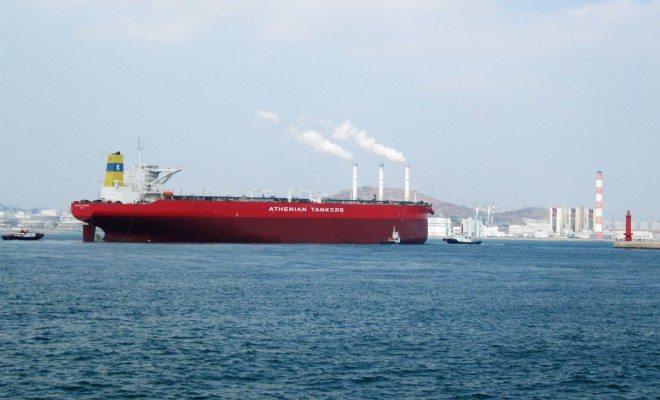 Image courtesy of [Seong-Woo Seo via Flickr]
Image courtesy of [Seong-Woo Seo via Flickr]
Energy and Environment
Lifting the Ban on Crude Oil and Natural Gas Exports: It’s Time to Make a Change
Earlier this week, a New Hampshire voter asked Hillary Clinton if she would sign a bill in favor of building the Keystone XL Pipeline. Clinton sidestepped the question. stating: “this is President Obama’s decision…if it’s undecided when I become president, I will answer your question,” she said.
The Keystone XL Pipeline has been on the forefront of American politics for quite some time now, and Clinton’s reply to the issue has been typical of her response to climate-related questions in general: avoidance. But one oil-related issue, the U.S. ban on crude oil and natural gas exports, is one that can’t be avoided any longer, although it’s certainly not something you really hear the presidential contenders talking about either.
Under American law, energy companies are not allowed to export crude oil, and companies can only export natural gas to countries with which the United States has a free-trade agreement. The Energy Department can approve natural gas exports to other countries if it deems such sales to be in the public interest; currently, 46 out of 52 such applications have been approved. These policies have their roots in the 1970s energy crisis, a period in which interruptions in petroleum imports from the Middle East caused wild price fluctuations and supply shortages.
For 40 years, these policies made sense. With domestic production declining and the U.S. importing 60 percent of its oil as recently as 2005, the export ban served its function to protect the market from fluctuations and shortages.
The situation is not quite the same today. The increasing prevalence of fracking–a new more efficient method of extracting crude oil–has saturated the domestic market. There is an important distinction to be made between the “light oil” that we are producing in growing quantities and the heavier crude oil that we typically import. Many of our refineries are designed to process heavy oil, and running light oil through these refineries decreases output capacity and revenue due to the incompatibility of light oil with equipment. Consequently, refiners demand significantly lower prices for domestic light oil and the export ban forces suppliers to accept these low prices.
Interestingly, the export ban does not include gasoline and other refined products, rendering the laws of supply and demand that dictate the value of goods in a capitalistic society irrelevant to domestic refiners. Instead, the ban creates an unfair system in which refiners purchase cheap oil in a domestic crude oil market saturated with supply, while their prices reflect the global refined oil market saturated with demand.
Lifting the export ban on crude oil and natural gas would force domestic refiners to compete with foreign refiners, raising the price of light oil and incentivizing suppliers to produce more. Increased production would require new jobs, and subsequent revenues would bolster the economy. Refiners would no longer be the main beneficiaries of cheap light oil. According to energy experts Daniel Yurgin and Kurt Barrow, lifting the export ban, combined with continuing progress in production technology, would lead to as much as 2.3 million barrels of additional production a day. Yurgin and Barrow estimate that this increased production would reduce gas prices by as much as 12 cents a gallon, saving US motorists $420 billion over 15 years.
There are diplomatic advantages to lifting the ban as well. Russia supplied 30 percent of Europe’s gas in 2014, regularly using gas as a diplomatic tool to threaten foreign economies. Last year, Russia declared that it would no longer sell gas at a discounted price to Ukraine, which gets 60 percent of its natural gas supply from Russia. In the Middle East, ISIS’s operations are funded heavily through pirated oil. According to Andy Karsner, former assistant energy secretary in the Bush administration, “We have one bullet that hits both of them: bring down the price of oil.”
At the very least, U.S. oil exports would stabilize the market and provide our allies with viable alternatives to OPEC or Russian energy–perhaps the Western response to Russia’s aggressive actions in Ukraine last year would have been stronger had there been a U.S. presence in the global oil market. Pioneer Natural Resources CEO Scott Sheffield notes, “It’s hard to believe we’re asking the Japanese to stop taking Iranian crude, but we won’t ship them any crude ourselves.”
It is impossible to predict all the implications of lifting the export ban, of course. Foreign suppliers may reduce their oil exports to maintain the high global price of oil, or Russia could engage in predatory pricing to drive U.S. suppliers out of the market. Perhaps increased fracking regulations will reduce the supply of domestic oil, minimizing our influence in the market. Regardless, lifting the export ban gives our government another front to exert diplomatic influence, engage our enemies, and improve our economy. It’s economics and diplomacy 101. Let’s just hope members of Congress paid attention in class, and that our presidential candidates make an effort to address this essential issue.








Comments